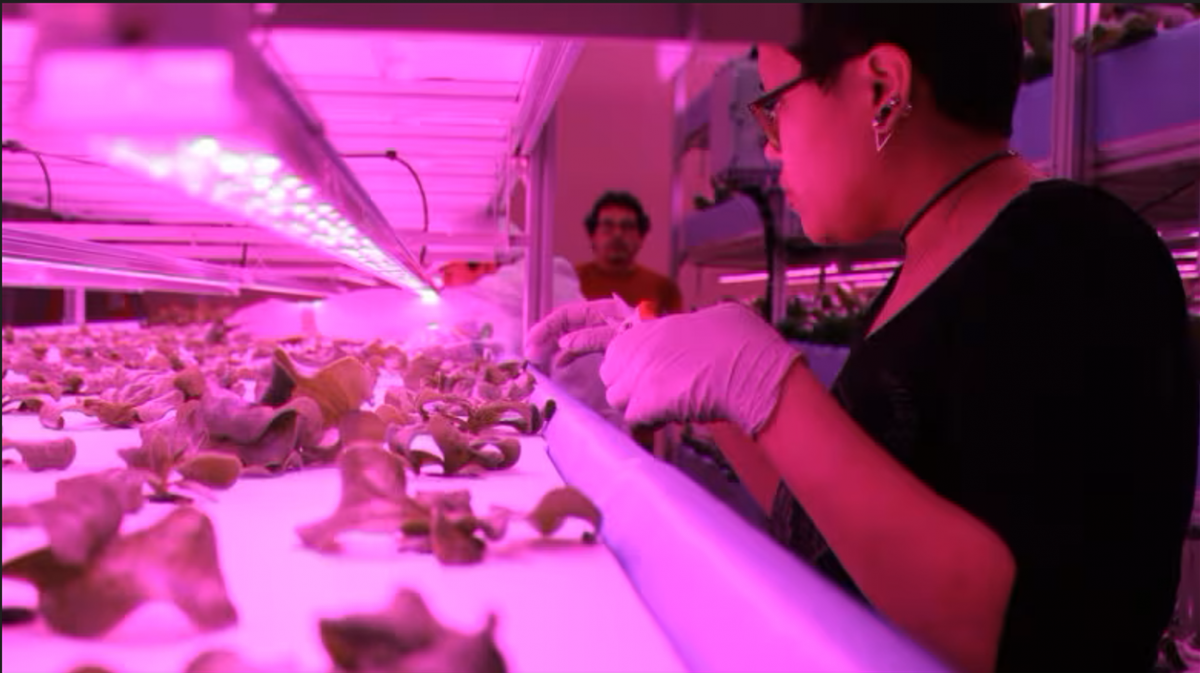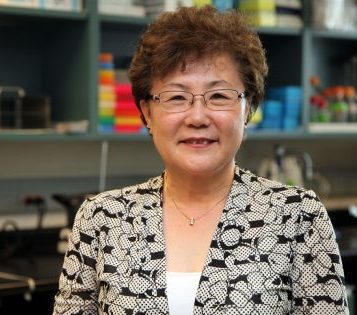
The SMART Vertical Farm uses LED lights and controls moisture and carbon dioxide to grow plants year-round. Photo: Glen Ross
UM Research to improve nutrition in Northern Manitoba receives new federal support
Dr. Miyoung Suh and 91 other UM Researchers receive more than $4.4 million in NSERC project funding
More than $4.4 million in project funding was announced today in support of 120 UM research proposals through the Natural Sciences and Engineering Research Council of Canada (NSERC).
Dr. Miyoung Suh, a Professor in the Department of Food and Human Nutritional Sciences, has received a Discovery Horizon Grant, placing her among the top 15 selected across Canada. The grant supports AI upgrades to the community-driven SMART-VF vertical farming initiative in Opaskwayak Cree Nation.
Started as a pilot project in 2016 with just seven plants, the high-tech northern farm now occupies 830 square feet, with capacity for more than 5,000 plants. This new funding of $250,000 over 5 years for Suh and her UM colleagues Dr. Young Jin Cha, Civil Engineering, Dr. Qiang Zhang, Biosystems Engineering and Dr. Champa Wijekoon, Agriculture Agri-Food Scientist.
Suh is a co-lead of the SMART Training Platform, funded by the Tri-Agency Council Healthy Cities Research Initiative alongside Dr. David Ma (University of Guelph) and Dr. Laurette Dube (McGill University). Suh’s UM project aims to address the high rates of diabetes in the northern Manitoba with improved year-round access to fresh produce. SMART-VF produces more than 40 types of vegetables and herbs which can be further enhanced with nutrient-enrichment with bioactive compounds, known for their anti-diabetic and anti-inflammatory properties.

Dr. Miyoung Suh
“Food is a basic entry point for building healthy communities and locally grown herbs and vegetables are a simple solution that’s having far reaching impacts,” says Suh. “The vertical farming beds currently use computer-monitored lighting to optimize growing conditions and with new deep learning-based control, informed by air, moisture and nutrient sensors, we can maximize nutritional benefits for diabetes management.”
Overall, Smart-VF has the potential to supplement the diets of more than 98,000 people living in northern or rural communities in Manitoba and across the North. Investigating the long-term health effects of fresh vegetables also contributes to the Truth and Reconciliation Commission’s 19th Call to Action by seeking to close gaps in health outcomes between Indigenous and non-Indigenous communities.
“The SMART-VF project has demonstrated remarkable growth over the past eight years,” says Dr. Mario Pinto (Vice-President Research & International). “This working model for Northern First Nations communities across Canada is an exciting example of research by, for, and with Indigenous Peoples, which is a key strategic priority at UM. I congratulate Dr. Suh and the many other researchers on achieving this competitive federal funding.”
This announcement also includes $4,284,936 million in long-term Discovery research grant funding for another 91 UM Researchers. Recognizing the creativity at the heart of all research advances, these funds promote flexibility to pursue emerging higher-risk research avenues as they appear.
“Canada’s science and research sector is solving some of the world’s greatest challenges, all while driving innovation, growth and productivity,” says François-Philippe Champagne, Minister of Innovation, Science and Industry. “Research programs like Discovery give researchers the flexibility to explore the most promising avenues of research as they emerge, to ensure Canada remains a world leader in science and new technologies.”
These NSERC funded programs including supplements for Northern research, Subatomic Physics Project Grants, ship time on ocean-going vessels and more than half a million dollars for research tools and instruments. The 120 Awards in the 2024-2025 NSERC Discovery portfolio represent a fifteen-year record success rate of 77% for UM researchers. The national success rate for 2024 was 63%.
Research at the University of Manitoba is partially supported by funding from the Government of Canada Research Support Fund.






